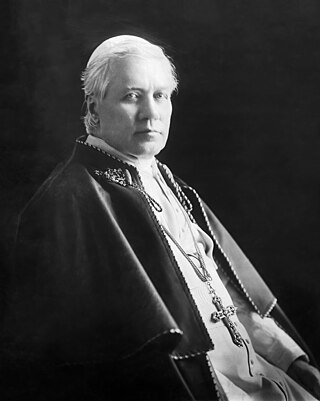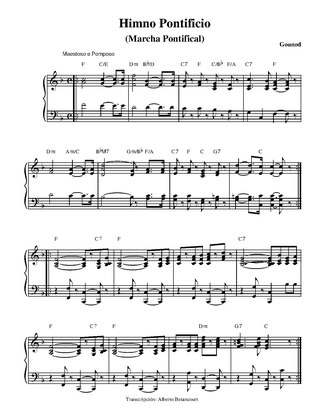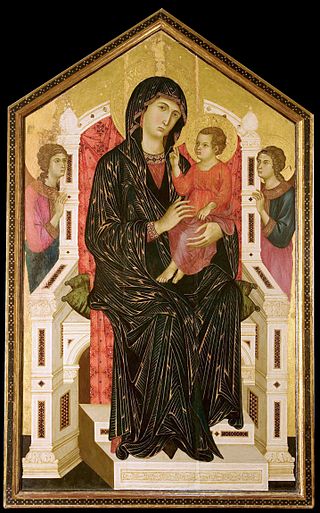Related Research Articles

Pope Pius X was head of the Catholic Church from 4 August 1903 to his death in August 1914. Pius X is known for vigorously opposing modernist interpretations of Catholic doctrine, and for promoting liturgical reforms and scholastic theology. He initiated the preparation of the 1917 Code of Canon Law, the first comprehensive and systemic work of its kind. He is venerated as a saint in the Catholic Church. The Society of Saint Pius X, a traditionalist Catholic fraternity formed decades after his death, is named after him.
A jubilee is a special year of remission of sins, debts and universal pardon. In Leviticus, a jubilee year is mentioned to occur every 50th year; during which slaves and prisoners would be freed, debts would be forgiven and the mercies of God would be particularly manifest.

The "Pontifical Anthem and March", also known as the "Papal Anthem", is the anthem played to mark the presence of the Pope or one of his representatives, such as a nuncio, and on other solemn occasions. When the Vatican's flag is ceremonially raised, only the first eight bars are played.

The Litany of the Blessed Virgin Mary is a Marian litany originally approved in 1587 by Pope Sixtus V. It is also known as the Litany of Loreto, after its first-known place of origin, the Shrine of Our Lady of Loreto (Italy), where its usage was recorded as early as 1558.

A Holy Door is traditionally an entrance portal located within the Papal major basilicas in Rome. The doors are normally sealed by mortar and cement from the inside so that they cannot be opened. They are ceremoniously opened during Jubilee years designated by the Pope, for pilgrims who enter through those doors may piously gain the plenary indulgences attached with the Jubilee year celebrations.

The Great Jubilee in 2000 was a major event in the Catholic Church, held from Christmas Eve 1999 to Epiphany 2001. Like other previous Jubilee years, it was a celebration of the mercy of God and forgiveness of sins. The major innovation in this Jubilee was the addition of many "particular Jubilees" for various groups of persons, and that it was simultaneously celebrated in Rome, Israel, and elsewhere in the world.
Munificentissimus Deus is the name of an apostolic constitution written by Pope Pius XII. It defines ex cathedra the dogma of the Assumption of the Blessed Virgin Mary. It was the first ex-cathedra infallible statement since the official ruling on papal infallibility was made at the First Vatican Council (1869–1870). In 1854 Pope Pius IX made an infallible statement with Ineffabilis Deus on the Immaculate Conception of the Virgin Mary, which was a basis for this dogma. The decree was promulgated on 1 November 1950.

A canonical coronation is a pious institutional act of the pope, duly expressed in a formal decree of a papal bull, in which the pope bestows the pontifical right to impose an ornamental crown, a diadem or an aureole to an image of Christ, Mary or Joseph that is widely venerated in a particular diocese or locality. The act was later regulated to Marian images only, through the De coronatione imaginum B.V. Mariae that was issued on 25 March 1973.
Anni sacri issued on the twelfth anniversary of his coronation, is an encyclical of Pope Pius XII on a program combating atheism.
The Church policies after World War II of Pope Pius XII focused on material aid to war-torn Europe, the internationalization of the Roman Catholic Church, its persecution in Eastern Europe, China and Vietnam, and relations with the United States and the emerging European Union.
Pope Pius XII apostolic constitutions and bulls includes a listing of all apostolic constitutions and papal bulls issued by Pope Pius XII (1939-1958):

Fulgens corona is an encyclical by Pope Pius XII, given at St. Peter's, Rome, on 8 September 1953, the Feast of the Nativity of the Blessed Virgin Mary, in the fifteenth year of his Pontificate. The encyclical proclaims a Marian year for 1954, to commemorate the centenary of the definition of the dogma of the Immaculate Conception of the Virgin Mary.

The theology of Pope Pius XII is reflected in his forty-one encyclicals, as well as speeches and nearly 1000 messages, during his almost 20-year pontificate. The encyclicals Mystici corporis and Mediator Dei advanced the understanding of membership and participation in the Catholic Church. The encyclical Divino afflante Spiritu began opening the door to historical-critical biblical studies. But his magisterium was far larger and is difficult to summarize. In numerous speeches Catholic teaching is related to various aspects of life, education, medicine, politics, war and peace, the life of saints, Mary, the mother of God, things eternal and temporal.

The Mariology of the popes is the theological study of the influence that the popes have had on the development, formulation and transformation of the Roman Catholic Church's doctrines and devotions relating to the Blessed Virgin Mary.
Mirabile illud is an encyclical of Pope Pius XII on the crusade of prayer for peace, given at Rome from St. Peter's on the 6 December 1950, the twelfth year of his Pontificate.

Mariological papal documents have been a major force that has shaped Roman Catholic Mariology over the centuries. Mariology is developed by theologians on the basis not only of Scripture and Tradition but also of the sensus fidei of the faithful as a whole, "from the bishops to the last of the faithful", and papal documents have recorded those developments, defining Marian dogmas, spreading doctrines and encouraging devotions within the Catholic Church.

Le pèlerinage de Lourdes is the only encyclical of Pope Pius XII issued in French. It includes warnings against materialism on the centenary of the apparitions at Lourdes. It was given at Rome, from St. Peter's Basilica, on the feast of the Visitation of the Most Holy Virgin, July 2, 1957, the nineteenth year of his pontificate.

The Extraordinary Jubilee of Mercy was a Catholic period of prayer held from 8 December 2015, the Solemnity of the Immaculate Conception, to 20 November 2016, the Feast of Christ the King. Like previous jubilees, it was seen by the Church as a period for remission of sins and universal pardon focusing particularly on God's forgiveness and mercy. It was an extraordinary Jubilee because it had not been predetermined long before; ordinary jubilees are usually celebrated every 25 years.

Our Lady of Arabia is a Catholic title of the Blessed Virgin Mary holding a Rosary and the Child Jesus, as venerated in Kuwait and Bahrain by its faithful devotees. Under this venerated Marian title, she is designated as the patroness of the Apostolic Vicariates of Northern and Southern Arabia.

Misericordiae vultus is a papal bull of indiction issued on April 11, 2015, by Pope Francis, proclaiming an Extraordinary Jubilee of Mercy from 8 December 2015, the Feast of the Immaculate Conception, to 20 November 2016, the Feast of Christ the King.
References
- ↑ "What is A Holy Year". Vatican Jubilaeum. Retrieved March 3, 2024.
- ↑ "Jubilaeum Maximum, 1950". Annuario pontificio (1949). Libreria Editrice Vaticana. 1949. ISBN 978-8820961497.
